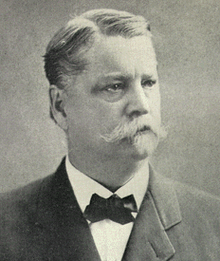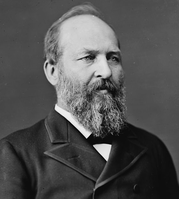1880 United States presidential election in Alabama
The 1880 United States presidential election in Alabama took place on November 2, 1880, as part of the 1880 United States presidential election. Alabama voters chose ten representatives, or electors, to the Electoral College, who voted for president and vice president.[2]
| ||||||||||||||||||||||||||
| Turnout | 12.03% of the total population | |||||||||||||||||||||||||
|---|---|---|---|---|---|---|---|---|---|---|---|---|---|---|---|---|---|---|---|---|---|---|---|---|---|---|
| ||||||||||||||||||||||||||
 County Results | ||||||||||||||||||||||||||
| ||||||||||||||||||||||||||
| Elections in Alabama | ||||||||
|---|---|---|---|---|---|---|---|---|
 | ||||||||
|
||||||||
|
||||||||
|
| ||||||||
Alabama was won by General Winfield Scott Hancock (D–Pennsylvania), running with former Representative William Hayden English, with 59.99% of the popular vote, against Representative James Garfield (R-Ohio), running with the 10th chairman of the New York State Republican Executive Committee Chester A. Arthur, with 37.10% of the vote.[2]
Results
| United States presidential election in Alabama, 1880[2] | ||||||||
|---|---|---|---|---|---|---|---|---|
| Party | Candidate | Running mate | Popular vote | Electoral vote | ||||
| Count | % | Count | % | |||||
| Democratic | Winfield Scott Hancock of Pennsylvania | William Hayden English of Indiana | 91,130 | 59.99% | 10 | 100.00% | ||
| Republican | James Garfield of Ohio | Chester A. Arthur of New York | 56,350 | 37.10% | 0 | 0.00% | ||
| Greenback | James B. Weaver of Iowa | Barzillai J. Chambers of Texas | 4,422 | 2.91% | 0 | 0.00% | ||
| Total | 151,902 | 100.00% | 10 | 100.00% | ||||
gollark: With even more hackiness you can switch over to an in-memory rootfs.
gollark: Oracle Cloud ARM instances only have "Oracle Linux" or something terrible, but someone made a cool bootstrapping script which writes an Alpine install to the swap partition and boots into that.
gollark: Doesn't matter if they allow it officially, that's what the horrible accursion is for.
gollark: I always just use horrible accursion to install my favoured OS on cloud platforms.
gollark: Maybe I should run it on 1908254717975918 incredibly low-resource VMs, for purposes.
References
This article is issued from Wikipedia. The text is licensed under Creative Commons - Attribution - Sharealike. Additional terms may apply for the media files.


